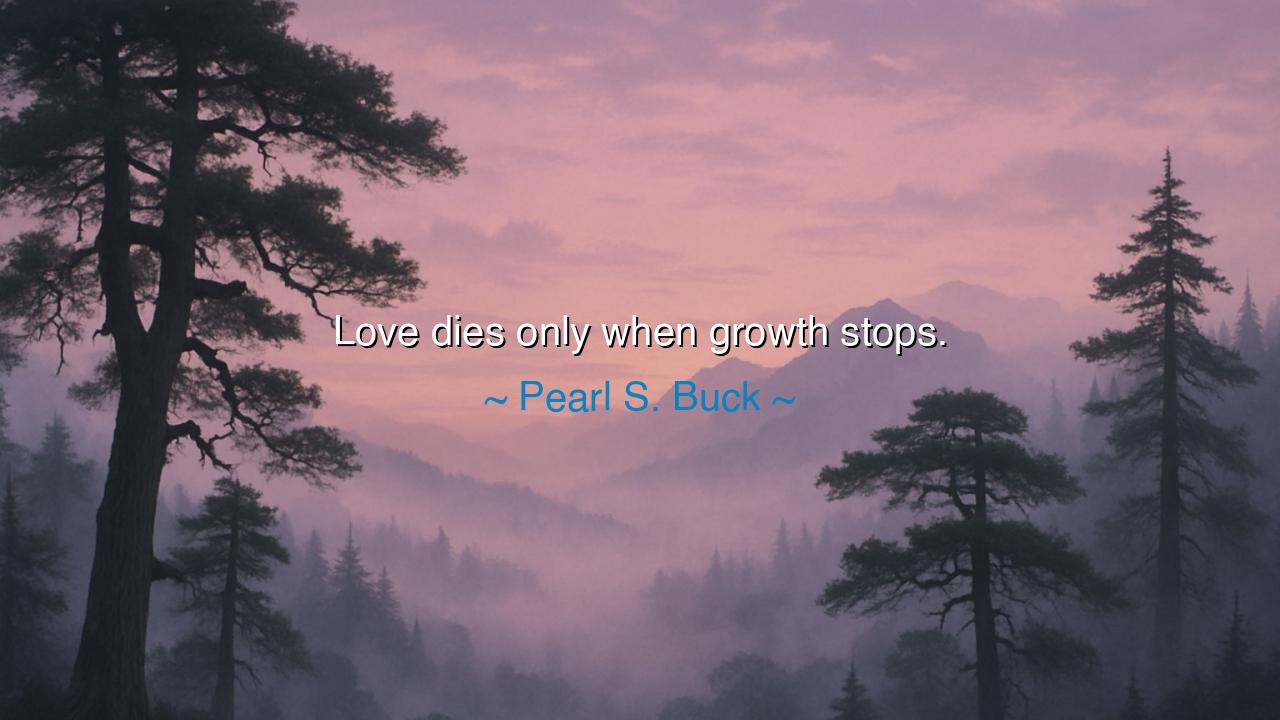
Love dies only when growth stops.






"Love dies only when growth stops." These words of Pearl S. Buck strike at the heart of one of the deepest truths of human existence. Love, in its purest and most enduring form, is not a stagnant emotion but a dynamic force that thrives on growth, change, and evolution. It is the very essence of human connection, and like a plant or tree, it requires nourishment, care, and most importantly, growth to flourish. Love that does not grow—love that remains fixed, unchanging, and unwilling to evolve—will inevitably wither and die. Just as the body cannot live without food and water, love cannot survive without the continual process of growth and transformation.
O children of the earth, understand this: love is not something that remains static, nor is it a feeling that can be captured and held forever in its original form. Love is alive, like the seasons that change, the river that flows, or the tree that stretches toward the sky. To love is to be in a state of continual motion, to always seek deeper understanding, connection, and mutual growth with the other. It is only when love stops evolving—when it becomes complacent or stagnant—that it dies. Therefore, to preserve love, we must always work towards its growth, nurturing it with new experiences, new understandings, and new ways of being together.
Consider the example of Marie and Pierre Curie, whose love for each other was not only a deep personal connection but also a partnership in the pursuit of knowledge. Their love was not defined by comfort or routine but by a shared passion for discovery. Together, they sought to uncover the secrets of the atom, and in doing so, their love grew stronger. Their love was rooted in growth—not just as individuals, but as a collective force of two minds and hearts bound by a common purpose. Their partnership exemplifies the idea that love thrives when there is constant growth and shared purpose. Even in the face of adversity, as Pierre Curie tragically died young, Marie Curie continued to pursue their shared dream, proving that true love does not die—it evolves, adapts, and endures, even in the face of loss.
Similarly, the lives of Abraham Lincoln and Mary Todd Lincoln offer another example of how love can survive and thrive through growth. Their relationship was not without its challenges. Mary Todd Lincoln struggled with personal loss and the pressures of the time, while Abraham Lincoln, as president during the Civil War, bore the weight of a nation in crisis. Yet through all the difficulties they faced, their love grew. It was tested by the immense weight of grief, by the burdens of leadership, and by personal differences, but in the end, their connection deepened, founded on mutual respect, shared hardship, and the continuous need to evolve in the face of life’s trials. In their lives, we see that love does not perish when faced with hardship—it is in adversity that love grows deeper, stronger, and more resilient.
And yet, love that does not grow—love that stops evolving—begins to fade. It becomes stagnant, no longer vibrant or nurturing. The story of Antony and Cleopatra offers a tragic reminder of this. Their love was all-consuming at first, but as time passed, they became more entangled in their own desires for power and dominance. Their bond, once rooted in shared passion and ambition, began to crumble as they stopped growing together. Their deaths, marked by betrayal and despair, serve as a poignant reminder that love must be tended to constantly. When it ceases to evolve, when it becomes a mere possession or something to hold onto for self-satisfaction, it turns toxic, withering until it can no longer sustain itself.
O children, know this: love requires effort. It requires work, self-awareness, and a willingness to change. You cannot expect love to remain as it was when it first bloomed. It must be nourished, allowed to evolve, and given space to grow. The great relationships in history were not built on the foundation of perfection, but on the constant willingness of both individuals to grow together. Love does not demand that we be perfect; it demands that we be open to growth, that we are willing to learn from one another, to evolve, and to adapt.
So, O seekers of wisdom, in your own life, let love be a living thing, constantly nurtured and allowed to grow. Do not allow your relationships to become stagnant or complacent. Understand that as you grow as individuals, so too must your love grow. Challenge yourself and your loved ones to seek new ways of being together, to learn from each other, to push each other to greater heights. For when love grows, it becomes a force that not only survives but thrives, lasting far beyond what you can imagine.
And finally, remember this: love dies not because it is abandoned, but because it is allowed to stop growing. Commit to the growth of your relationships. Embrace change, vulnerability, and the unknown. Let your love be a constant force of renewal, constantly reaching towards new heights, new understanding, and new depths. In doing so, you will find that love, in its purest form, is eternal, for it grows alongside you, never ceasing, always evolving, and always thriving.






AAdministratorAdministrator
Welcome, honored guests. Please leave a comment, we will respond soon